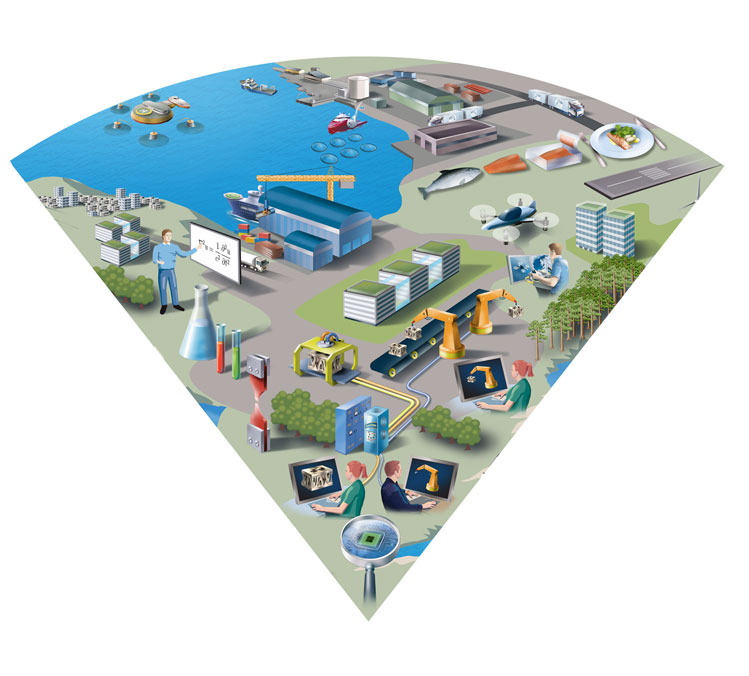Competitive and sustainable manufacturing
Competitive and sustainable manufacturing (Production)
 Ilustrasjon: Bjarne Stenberg
Ilustrasjon: Bjarne StenbergStrategic Research Areas
-
Products and production processes
-
Properties of materials
-
Digitization and automation of production
-
Value chains and industrialization
-
One-of-a-kind production
Norwegian society is dependent on sustainable value creation, and the industrial sector is the backbone of this value creation. Development and utilization of technology to develop, manufacture and deliver products and services based on the natural factors of our environment and our expertise must be given priority.
Although the research focuses on conditions here at home, it must also be aware of the globalization aspects with the opportunities and challenges this presents for production in Norway.
The Government’s Industry White Paper, which was presented in March 2017, highlights the need for applying new materials as well as for changing, automating and digitizing processes. A reindustrialization process is needed, in which Norwegian industry is able to bring back manufacturing previously outsourced to low-cost countries. Organizations that have succeeded in bringing production home highlight strategic initiatives in skills development, digitization and automation. Similarly, these factors are important to keep existing production in Norway.
The Industry White Paper highlights the need for restructuring within sustainable limits, the significance of access to capital and access to skills, and the importance of research, innovation and technological development.
In the area of sustainability, NTNU contributes with development of methodology, especially within the circular economy. A circular economy involves reusing resources, reducing levels of waste and energy in all manufacturing processes, making better and more effective use of resources, increasing product lifetime and using more recycled materials in new products. To attract Norwegian and international players to invest in Norway, in the future it will be necessary to demonstrate that the activity is sustainable, and to use the knowledge we have from the circular economy to choose the best solutions.
NTNU’s research in production must be internationally recognized, must represent the great advantages of Norwegian industry, and must contribute to sustainable value creation and social development nationally and globally. The five strategic research areas for production include most of the Faculty’s existing research to support competitive and sustainable manufacturing. A success factor for the Faculty’s research is effective collaboration with research groups at other faculties at NTNU. This applies especially to the disciplines in economics, science and information technology. Similarly, it is important to develop further collaboration with SINTEF.
NTNU IV will conduct research on product and process development throughout the Technology Readiness Level (TRL) and Manufacturing Readiness Level (MRL) scales. We will contribute to basic research within TRL/MRL 1-4 and applied research in TRL/MRL 4-7, and research the best possible ways
